
Marcel Duchamp About young sister 1911



Meloni identity
Wow. Italy’s new Prime Minister Giorgia Meloni sums it up perfectly. No wonder the elites and establishment don’t want her to succeed. pic.twitter.com/aYdecShaNs
— Malcolm Roberts 🇦🇺 (@MRobertsQLD) September 26, 2022



Net Zero
https://twitter.com/i/status/1574280761913524224

This one is a bit older.
If you’re wondering why all the worst people on the planet are having a meltdown over Giorgia Meloni’s victory in the Italian elections last night, here’s why: pic.twitter.com/RZ62904w9Y
— Alana Mastrangelo (@ARmastrangelo) September 26, 2022

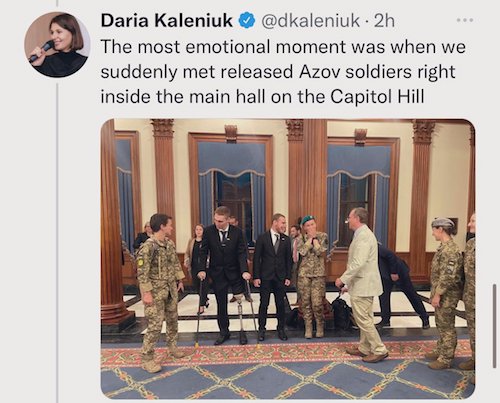


“Madame von der Leyen’s fellow Germans have already been sent to their room without so much as a kartoffelklop, plus no heat or hot showers for you, Hansel and Gretel.”
• This Is the Way the World Ends (Jim Kunstler)
The bond market has gone south, and that spells The End for the great game of financialization. The bond market is Moby Dick compared to the little blowfish that is the stock market. The global money system is based on bonds, which are… what? That’s right: loans… promises to pay you X at some future moment. So, what happens when a daisy-chain of promises-to-pay gets broken? Or, perhaps more precisely, when all those promises lose their last shred of plausible reality? Why, the money that these broken promises are denominated in loses its essential cred. Trick question: how much is worthless money worth? (Answer: not enough to pay for a can of Schrödinger’s cat food.) Which is where all this folderol leaves a lot of ordinary people all over Western Civ (and beyond!) trying to scratch up enough increasingly worthless money to feed the family and pay the landlord. Many will never understand what happened. But they will not be any less pissed off at the result.
This is the way the world ends for the hapless phantom known as “Joe Biden” the child-sniffing ectoplasm that haunts the White House these days of late empire. Somehow, the bamboozled nation has so far passively accepted the pranks and punishments laid on them by the backstage managers behind the Figment-in-Chief. Eight-plus percent inflation? No problemo, right? Eighty-five thousand new IRS agents on-board to drive you batshit while destroying your household and your posterity (ha!)? Half the population of South America flooding across the border? (The vibrancy! You no like?) A hundred dollar fill-up at the gas pump, and no heat for you this winter? (But… Netflix!) Drag queens to amuse and edify your children about the delirious realm of sexual pathology. All that…and how about a Russian hypersonic nuclear missile up your ass if the preceding somehow failed to move you? (Because: Russia, Russia, Russia…!)
Meanwhile, a trend is manifesting in other lands. The people of, first, Sweden and now Italy are voting in “right wing” nationalist governments — the horror — sending their equivalent of our Party of Chaos to the showers. This has irked the President of the European Union, one Ursula von der Leyen, no end. She has threatened to send Italy to its room without supper for the effrontry. Of course, Madame von der Leyen’s fellow Germans have already been sent to their room without so much as a kartoffelklop, plus no heat or hot showers for you, Hansel and Gretel. Embrace the suck.

No way back.
• Ukrainian Territories To Be Absorbed Into Russia By Week’s End: Lawmaker (ZH)
With four occupied regions of Ukraine currently in the midst of a five-day referendum on whether to join the Russian federation, a Kremlin lawmaker told state media over the weekend that the territories are likely to be absorbed by Russia on September 30. “Taking into account the preliminary results of the referendums and Russia’s readiness to acknowledge them, the accession of the territories is likely to take place as early as on September 30,” the unnamed member of Russia’s State Duma said to TASS. Voting is set to conclude Tuesday in Donestk, Luhansk and the Kherson and Zaporizhzhia regions, meaning as early as Wednesday or even Thursday announcements of results are likely to trickle out, paving the way for a potential Friday official declaration.
While Russian forces do not yet control the entirety of each of these territories, their annexation would constitute Ukraine losing almost 20% of its geographic territory. Russian President Vladimir Putin might himself make the proclamation following the referendums, which Ukrainian leaders along with Washington have dismissed as a “sham” – saying they won’t be recognized. Russian media reports indicate: The lawmaker said Russian President Vladimir Putin could take part in the procedure on September 30. “I don’t know if he will [participate], but he is likely to do so,” the MP said. Given that on Saturday Foreign Minister Sergey Lavrov vowed new territories would be under Russia’s “full protection” – there is more than likely to be a major uptick in the intensity of fighting to follow the referenda results announcement in eastern Ukraine.
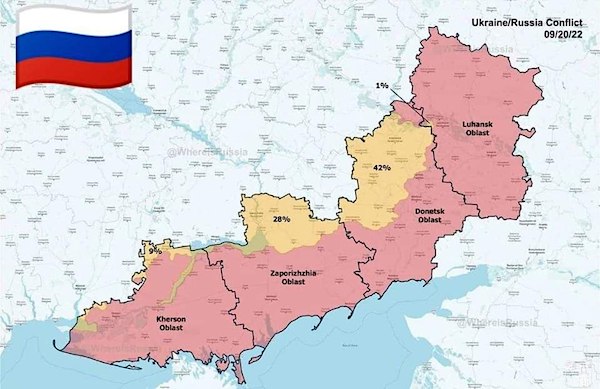

“..after so many years, Moscow is finally fully committed to supporting Donbass all the way to the baby bears coming to Mama for good.”
• All the Young Dudes, Carry the -Russian- News (Escobar)
Moscow’s rerouted strategy takes maskirovka – mask, feint, fool the enemy – to another level, actually dropping the mask, plus the velvet gloves. Now it’s all very clear: this is turbo-charged Sun Tzu (“May your plans be dark and impenetrable like the night, and when you move, strike like lightning.”) There will be plenty of strikes like lightning ahead in the Ukrainian battlefield. This is the culmination of a process that started in Samarkand, during the SCO summit last week. According to diplomatic sources, Putin and Xi Jinping had a very serious conversation. Xi asked tough questions – as in you must finish this off – and Putin arguably explained how things would reach the next level.
Yoda Patrushev was on the road to China immediately afterwards – meeting with his Yoda counterpart Yang Jiechi, head of the Foreign Affairs Commission, and the secretary of the Central Political and Legal Committee, Guo Shengkun. Following-up on Samarkand, Patrushev outlined how Moscow will help Beijing militarily when the Empire tries anything funny in the next battlefield: Asia-Pacific. That should happen under the framework of the SCO. Crucially, the Patrushev meetings were requested by the Chinese. So the Russia-China strategic partnership is about to achieve full-fledged cooperation before the going gets tough in the South China Sea. It’s as if Russia-China were on the brink of creating their own CSTO.
And that is happening even as the Chinese leadership continues to express – mostly in private – that war in Russia’s western borderlands is very bad for business (BRI, EAEU, SCO, BRICS+, all of them) and should be wrapped up a.s.a.p. The problem is a swift wrap-up is off the cards. Foreign Minister Lavrov, in New York for the UN General Assembly, has stressed how. “Ukraine has eventually become a totalitarian Nazi sort of state” – unconditionally supported by the collective West. NATOstan has predictably doubled down on its tactics since the non-response response to Russia’s demand for a serious discussion on indivisibility of security, in late 2021: it’s always about shelling Donbass. This could not possibly be tolerated anymore by the Kremlin and Russian public opinion.
Thus the partial mobilization – forcefully proposed by the siloviki and the Security Council for quite a while now, with Kostyukov at GRU, Naryshkin at SVR and Bortnikov at FSB on the forefront. The symbolism is powerful: after so many years, Moscow is finally fully committed to supporting Donbass all the way to the baby bears coming to Mama for good. There are – unconfirmed – rumors in Moscow that the decision was accelerated because GRU has intel on the Americans soon transferring long-range missiles to Kiev capable of striking Russian cities. That’s beyond a red line for the Kremlin – hence Putin’s express mention that every weapon available in Russia’s mighty arsenal will be used to protect the Motherland.

Lowballing.
• Zelensky Reveals US Pays Ukraine $1.5 Billion Per Month (RT)
The Ukrainian government is being heavily supported with American money, with Washington contributing $1.5 billion per month to the budget, Ukraine’s President Vladimir Zelensky has revealed. The sum was mentioned by the Ukrainian leader during an interview with CBS host Margaret Brennan for the ‘Face the Nation’ program, which was aired on Sunday. Currently Kiev runs “a deficit of $5 billion in our budget,” Zelenksy said, adding that “the United States gives us $1.5 billion every month to support our budget to fight” against Russia. Zelensky argued that arming and otherwise helping Ukraine militarily is a “win-win” for the US. He pledged that once Russia is defeated, the Ukrainian people will return to their home country and start paying taxes there, relieving the burden on American taxpayers.
“For the United States, it will be significant savings, but for us, it will be an opportunity to secure our territory and make it safe for our population,” he stated. US President Joe Biden has pledged to help Ukraine “for as long as it takes” to secure a strategic defeat of Russia, which he declared Washington’s ultimate goal in the conflict. Many Americans do not share the president’s view that the situation in Ukraine is crucial. According to the conservative election pollster Rasmussen Reports, it failed to make the top-ten list of issues of concern for likely voters. Earlier this month, the Biden administration asked Congress to authorize some $12 billion in additional aid for Ukraine, including $4.5 billion to support the Kiev government financially beyond September. It asked for $2 billion on top of that, to help Ukraine offset rising energy prices.
The package is expected to be approved on Friday, but some political analysts question whether the cash flows to Ukraine can be sustained after the midterm elections in November. “America can’t afford to provide a blank checkbook to Ukraine when we have inflation, gas prices, a supply chain crisis, all of the above, going on at home,” a GOP lawmaker told Politico, speaking on the condition of anonymity. “That’s what I’m hearing from my voters.” The outlet predicted that if the Republican Party wins the House, Biden will face more resistance to his requests for emergency aid to Ukraine.

“In the course of negotiations with our president, Putin announced the possibility of returning to negotiations with Kiev, but on new conditions that have appeared,”
• Putin Considering Talks With Kiev On New Conditions – Turkish FM (RT)
Russian President Vladimir Putin is considering resuming talks with Ukraine, Turkish Foreign Minister Mevlut Cavusoglu said on Monday. The top diplomat made the remarks during a press conference in Tokyo where he’s attending the funeral of former prime minister Shinzo Abe, who was assassinated in July. According to Cavusoglu, Putin floated the idea during a conversation with his Turkish counterpart Recep Tayyip Erdogan at the recent summit of the Shanghai Cooperation Organisation (SCO) in Samarkand, Uzbekistan. “In the course of negotiations with our president, Putin announced the possibility of returning to negotiations with Kiev, but on new conditions that have appeared,” Cavusoglu was quoted as saying, He didn’t elaborate on the “conditions” specified.
The minister also reiterated Ankara’s desire to stage direct talks between Putin and Ukrainian President Vladimir Zelensky. “Our president will continue his contacts with Putin and Zelensky. Our aim is to bring the two leaders together to ensure that decisions are made at the level of the leaders,” Cavusoglu said. Top Russian officials have repeatedly said Moscow has been ready to talk with Kiev, pinning the blame for the stalled negotiations on the Ukrainian side. Last week, Kremlin spokesman Dmitry Peskov said dialogue is “of course needed,” adding that Putin had already explained that “Ukraine left the negotiations several months ago.”
Apart from declaring the goal of defeating Moscow on the battlefield, Ukrainian officials have also reacted angrily to the referendums on joining Russia, currently ongoing in the Donbass republics and Zaporozhye and Kherson Regions in southern Ukraine. On Sunday, Zelensky warned that should Russia complete the vote, it would “make it impossible, in any case, to continue any diplomatic negotiations” with Moscow.

“Normally” Eugyppius writes on Covid. But he’s in Germany…
• German Energy Apocalypse Update V (Eugyp)
Germany has nationalised the gas importer Uniper, to save it from insolvency in the face of the Gazprom gas stoppage. Robert Habeck’s earlier scheme to save Uniper and other importers involved the imposition of a gas surcharge of 2.4 cents per kilowatt hour on all consumers, but the government appears ready to scrap this plan just days before it was set to go into effect. Instead, some politicians are now talking of capping gas prices, though as far as I can tell, nobody has any idea how. As the pressure builds and the first closures begin, Germany is entering an economic recession, and there are everyday renewed cracks in the political edifice.
Minister President of Saxony Michael Kretschmer (CDU) – no fringe political figure – recently remarked that Germany “cannot do without Russian gas” and acknowledged that EU sanctions are to blame for the shortage, but he stopped short of demanding that Nord Stream 2 be opened; instead, he hopes for a return to Russian gas after the Ukraine war has ended. The Greens in government remain committed to taking Germany’s last nuclear power plants offline by the end of the year, hoping that enough French nuclear plants will return to service over the winter to cover any resulting shortages. It is hard to imagine a more farcical approach to nuclear energy.
Meanwhile, the head mayor of Berlin has suggested that two- or three-hour periods of load-shedding may be necessary to keep the electrical grid functional over the winter. Other experts, while downplaying the risk of uncontrolled outages, have raised the possibility load-shedding as well, confirming that these are very real contingency plans and that we’re being prepared for them. The stated concern is invariably that local or regional gas shortages will cause the widespread activation of electrical heaters and overwhelm the grid, though how exactly this could be anticipated far enough in advanced for scheduled outages is unclear to me. Prices have increased vastly across the economy, and estimates are that up to 60 percent of German households are now committing their entire monthly income to cover the rising cost of living.
The depth of the crisis isn’t fully known, as loan defaults and similar economic signals won’t begin in earnest until 2023. And that’s it. There are no plans from the government, beyond doubtful price-tinkering, regulatory schemes and targeted financial assistance. If you look at those news outlets most guilty of Corona hysteria, like the state-funded Tagesschau or the Süddeutsche Zeitung, you find extremely muted reporting on the crisis. Instead, hyperventilation about Ukraine continues to dominate headlines; pieces on the energy apocalypse are either misleading items like this one, hailing a dip in gas prices, or trivial write-ups about whether cities should cancel their Christmas lighting this year.

Well, the Russians don’t blow up their own pipelines…
• Germany Suspects ‘Targeted Attack’ On Russian Gas Pipelines (RT)
While the loss of pressure in three natural gas pipelines between Russia and Germany is still officially being investigated, Berlin is reportedly no longer convinced it was a coincidence, and suspects a “targeted attack” on behalf of either Ukraine or Russia, the newspaper Tagesspiegel reported on Monday evening. Pressure in one of the Nord Stream 2 lines dropped sharply overnight, followed by the same happening to both Nord Stream 1 pipes on Monday afternoon. Denmark announced that a gas leak was spotted off the coast of Bornholm island in the Baltic Sea and closed the area for maritime traffic, but could not confirm if this was what caused the pressure loss.
According to Tagesspiegel, the German government and agencies investigating the incident “can’t imagine a scenario that isn’t a targeted attack,” according to an anonymous source familiar with their assessments. “Everything speaks against a coincidence.” The outlet explained that a deliberate attack on the bottom of the sea has to involve special forces, navy divers or a submarine. Berlin is reportedly examining two possible scenarios. In the first, Ukraine or “Ukraine-affiliated forces”could be behind the attack. The second option is that Russia did it as a “false flag,” to make Ukraine look bad and drive the EU energy prices even higher.
With Nord Stream offline since late August, Russian gas can only be delivered to Germany and central Europe via the older pipelines going through Poland and Ukraine, Tagesspiegel noted. “We are in the process of clarifying the situation here,” a spokeswoman for the federal ministry of economics told the outlet. “We don’t currently know what caused the pressure drop.” Nord Stream 1 was built in 2011. Construction on Nord Stream 2 began in 2018, and took much longer due to political pressure and economic sanctions from the US. NS2 was finished and pressurized by September 2021. However, two days prior to Russia’s military operation in Ukraine, the German government put its certification on indefinite hold, and has categorically refused any suggestion from Moscow – or its own people – to unblock the pipeline.
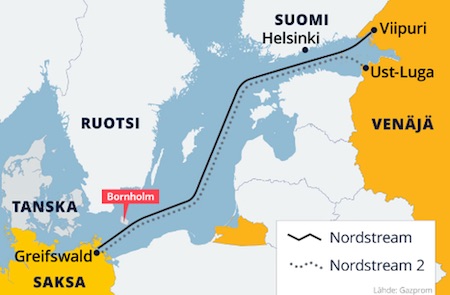

“Instead of a real military threat from Russia and China, the problem for American strategists is the absence of such a threat.”
• The US Is Winning Its War On Europe’s Industries And People (MoA)
On February 7 Professor of Economics Michael Hudson explained why America’s Real Adversaries Are Its European and Other Allies: “What worries American diplomats is that Germany, other NATO nations and countries along the Belt and Road route understand the gains that can be made by opening up peaceful trade and investment. If there is no Russian or Chinese plan to invade or bomb them, what is the need for NATO? And if there is no inherently adversarial relationship, why do foreign countries need to sacrifice their own trade and financial interests by relying exclusively on U.S. exporters and investors?
These are the concerns that have prompted French President Macron to call forth the ghost of Charles de Gaulle and urge Europe to turn away from what he calls NATO’s “brain-dead” Cold War and break with the pro-U.S. trade arrangements that are imposing rising costs on Europe while denying it potential gains from trade with Eurasia. Even Germany is balking at demands that it freeze by this coming March by going without Russian gas. Instead of a real military threat from Russia and China, the problem for American strategists is the absence of such a threat.” What the U.S. needed was to provoke Russia, and later China, into reacting to U.S. arranged threats in a way that would oblige its ‘allies’ to follow its sanction policies. The rather dimwitted European leadership fell for the trick.
The U.S. arranged for a Ukrainian attack on the rebel held Donbas region. This started on February 17 with intense artillery preparations against Donbas positions as recorded by the OSCE observers at that border. Russia had to react or see the ethnic Russians in those areas getting maimed and killed by Nazi devoting Ukrainians. There was no way to prevent that but by other than military means. On February 22 Russia recognized the Donbas republics as independent states and signed defense agreements with them. The same day the German chancellor Olaf Scholz canceled the launch of the undersea Nord Stream II pipeline which was to transport Russian gas to Germany’s industries and consumers. The Europeans launched a sequence of extremely harsh economic sanctions against Russia which, prodded by the U.S., had been prepared months in advance. Russia’s Special Military Operation, under Article 51 of the UN Charter, commenced on February 24.

“Without that we won’t even talk to them. Nobody is going to tolerate humiliation..”
• West Should Treat Us With Respect – Putin (RT)
Russia and Belarus are countries that are prepared to work with the West but only if there is mutual respect, presidents Vladimir Putin and Alexander Lukashenko agreed during a face-to-face meeting in Sochi on Monday. Speaking on tv channel Rossiya 24, Lukashenko said he believes the West’s future lies with Russia, which has “everything they need.” On the other hand, he added, the West has things Russia and Belarus need and are willing to buy, including certain technologies. “What else do they want? They just need to make responsible decisions,” he said said. Putin agreed with the Belarusian leader, insisting the West must “treat us with respect.”
“Without that we won’t even talk to them. Nobody is going to tolerate humiliation,”Lukashenko continued, noting that both Moscow and Minsk were open to working with those who want to live side by side, building relations based on mutual respect. The Russian leader has previously suggested that the West was essentially waging a hybrid war against Moscow and was looking to “weaken, disunite and ultimately destroy”Russia. In a televised address last week, Putin claimed that Western countries openly admit that they “managed to break up the Soviet Union in 1991”and were now aiming to “split Russia into many regions that would be at each other’s throats.”
As a means to that end, Putin claims the West has been intentionally fostering Russophobic sentiments in countries like Ukraine, where he accuses the US and its allies of installing a hostile government and of turning the Ukrainian people into cannon fodder by pushing them into war with Russia. Putin has also warned Western leaders who openly call for a military defeat of Russia that Moscow is prepared to use any means at its disposal to defend itself and to ensure its territorial integrity. US President Joe Biden has hit back at Putin, accusing him of “making irresponsible nuclear threats to use nuclear weapons.”

“..the president’s remarks were not an attempt to interfere with Italian domestic politics but rather meant to underline the body’s role “as guardian of the [European] treaties with regard to the rule of law.”
• Poland Slams ‘Scandalous’ Von der Leyen Warning (RT)
A warning by European Commission President Ursula von der Leyen that Brussels has tools to discipline Italy if its prospective center-right government fails to cooperate with the EU was “scandalous,” according to Polish Prime Minister Mateusz Morawiecki. The remark was a wake-up call for member states, the head of the Polish government said on Sunday, as quoted by state news agency PAP. “Is this the kind of Europe we want? Is this democracy and rule of law? That Eurocrats in Brussels decide what a government should be?”Morawiecki asked. He was responding to von der Leyen’s suggestion that, should the new Italian government fail to meet the EU’s policy expectations, the country could be disciplined.
The top official said “whatever democratic government is willing to work with us, we’re working together,” adding that “if things go in a difficult direction, I’ve spoken about Hungary and Poland, we have tools.” Von der Leyen spoke about Italy on Thursday at Princeton University, after it was suggested that people friendly to Russia could come to power in Rome after the election on Sunday. She was asked what the EU leadership plans to do about it. Morawiecki interpreted the remark as a promise to punish Italy, unless its new government is “in favor of Brussels.” European Commission spokesman Eric Mamer said that the president’s remarks were not an attempt to interfere with Italian domestic politics but rather meant to underline the body’s role “as guardian of the [European] treaties with regard to the rule of law.”
A center-right coalition led by Giorgia Meloni’s Brothers of Italy (FI) party looks set to form a new cabinet following a snap election in the country. The outcome was consistent with opinion polls ahead of the ballot. In mid-September, the European Commission recommended suspending some €7.5 billion of emergency funding to Hungary over alleged erosion of the rule of law in the country. A similar punishment was imposed on Poland last year over controversial judicial reforms adopted by its conservative government.

“..if – God forbid! – the Kremlin will face what the Russian military doctrine calls “a threat to the existence of the Russian Federation,” its nuclear weapons will not point to some location on the European continent, but more likely across the Atlantic.”
• Russia And The US Still Have Time To Prevent A Nuclear War (Trenin)
This October marks the 60th anniversary of the Cuban missile crisis, which drew Moscow and Washington into a nuclear showdown that threatened the immediate annihilation of the world. Luckily, the leaders of the time – Nikita Khrushchev and John F. Kennedy – had the wisdom to step back from the brink, and then engage with each other on first steps toward jointly managing adversity in the nuclear era. Given the current conflict in Ukraine, which is steadily escalating toward a direct military collision between Russia and the United States, there is a hope that the lessons of the past can also help to end the present confrontation on a peaceful note. However, we should also be mindful of the major differences between the two crises.
On the surface the root cause of both confrontations has been acute feelings of insecurity created by the expansion of the rival power’s political influence and military presence right to the doorstep of one’s own country: Cuba then, Ukraine now. This similarity, however, is almost as far as it goes. The salient feature of the Ukraine crisis is the vast asymmetry not only between the relevant capabilities of Russia and the United States, but even more importantly between the stakes involved. To the Kremlin, the issue is literally existential. Essentially, it is not only the future of Ukraine, but that of Russia itself that is on the table. To the White House, the issue is definitely important, but far less critical. What is in question is clearly US global leadership (which will not collapse within the Western world, whatever happens in Ukraine), its credibility (which can be dented but hardly destroyed), and the administration’s standing with the American people (for whom Ukraine is hardly a top concern).
[..] The problem is that its highly pro-active policy on Ukraine is based on a flawed premise that Russia can indeed accept being ‘strategically defeated’ and, should nuclear weapons be used, their use would be limited to Ukraine or, at worst, to Europe. Americans have a long tradition of ascribing their own strategic logic to their Russian opponents, but this can be fatally misleading. Ukraine, parts of Russia and Europe being hit by nuclear strikes – while the US emerges from the conflict unscathed – might be considered a tolerable outcome in Washington, but hardly in Moscow. [..] So many of Russia’s so-called red lines being breached without consequence from the start of the Ukraine war have created an impression that Moscow is bluffing, so that when President Vladimir Putin recently issued another warning to Washington, saying that “it is not a bluff,” some people concluded that it was precisely that.
Yet, as recent experience demonstrates, Putin’s words deserve to be taken more seriously. In a 2018 interview he said, “Why do we need a world in which there is no Russia?” The problem is that Moscow’s strategic defeat, which the US is aiming for in Ukraine, would probably ultimately result in “a world without Russia.” This probably suggests that if – God forbid! – the Kremlin will face what the Russian military doctrine calls “a threat to the existence of the Russian Federation,” its nuclear weapons will not point to some location on the European continent, but more likely across the Atlantic.

“Hungary to hold a referendum on the EU’s sanctions imposed on Russia, Prime Minister Viktor Orbán announces.
“The sanctions were not decided democratically, but were decided by Brussels bureaucrats and European elites,” he said on Monday.”
• Orban Says EU Sanctions on Russia Have ‘Backfired’ (R.)
Hungary should prepare for a prolonged war in neighbouring Ukraine, Prime Minister Viktor Orban said on Monday, sharply criticising European Union sanctions imposed on Russia which he said have “backfired”, driving up energy prices. Orban, long at odds with the EU over some of his policies seen in Brussels as anti-democratic, urged a ceasefire to end the war and said the sanctions against Russia were dealing a blow to Europe’s economy. Orban, who was reelected for a fourth consecutive term in April, now faces surging inflation, plunging consumer confidence and the prospect of a recession next year.
He told parliament it was no surprise that governments were falling in Europe, referring to the Italian election on Sunday following which Giorgia Meloni looks set to lead Italy’s most right-wing government since World War Two. “We can safely say that as a result of the sanctions, European people have become poorer, while Russia has not fallen to its knees,” Orban said. “This weapon has backfired, with the sanctions Europe has shot itself in the foot.” “We are waiting for an answer, the entire Europe is waiting for an answer from Brussels on how long we will keep doing this,” he said, adding it was also time to discuss the sanctions with the United States. Orban, whose government is in talks with the European Commission to secure billions of euros in EU funds blocked over rule-of-law concerns, said his government would launch a “national consultation” asking Hungarians about sanctions.
Orban has previously used this campaign tool to shore up domestic support for his Fidesz party on policies such as gay rights or migration. Orban said his government had revised its long-term energy strategy and aims to overhaul the power system and extend the lifespan of the Paks nuclear power plant, with a total of 32 big investments planned to be financed using EU funding. “If the Brussels bureaucrats do not give us this money, which Hungary is eligible for, then we will get the necessary funds from other financial sources,” Orban said, adding Hungary had started talks with the EU and “other international partners”. He did not elaborate.

“Dozens of nations representing half of humanity either backed Russia’s position on Ukraine or at least acknowledged the merits of Russia’s reasoning..”
• Moscow Tells US To ‘Back Off’ With ‘Aggressive’ Course (RT)
The US is taking an increasingly aggressive stance towards Moscow, but no amount of economic sanctions and political pressure can sway it from defending its national interests, a top Russian diplomat said. Moscow’s diplomacy regarding the US is an exercise in “crisis management”, Deputy Foreign Minister Sergey Ryabkov said in an interview on Russian television on Monday. He described US behavior as being “increasingly confrontational and worrisome.” “We can see how [the Americans] are trying to mobilize their satellites, their vassals to confront Russia in a more aggressive and hardline manner,” the diplomat said. “Washington’s irresponsible, extremely aggressive, extremely assertive course is bringing us all to the dangerous line. We are warning against maintaining this course.”
The brinkmanship has been evident not only when it comes to the crisis in Ukraine, but also in the all-important issue of nuclear non-proliferation and reduction, Ryabkov said. Washington has pretty much dismantled the entire architecture of strategic arms control and is threatening the last remaining bilateral treaty of that kind with Russia, the New START, he pointed out. The core of the problem, the diplomat said, is that the US “does not need agreements, which had been signed on the basis of parity, served not only the security interest of the group [of nations] led by the US, but strengthened the security of entire regions and the world in general. They are not in line with the hegemonic course that the US pursues in the international arena.”
The deputy minister said he didn’t expect US policy towards Russia to change anytime soon, because “there is an anti-Russian consensus of the elites” in the US. But the only viable solution is for Washington to recognize that Russia will not be bullied and act accordingly, Ryabkov added. “Time and time again we’ve told our American interlocutors, to use the most neutral term, that they have to back off and stop escalating the situation,” he said.
European nations, which sided with Washington’s anti-Russian drive, are suffering because of it, the Russian diplomat pointed out. In fact, their subservience to Washington makes them vulnerable to American exploitation, Ryabkov said. “[The Americans] are undermining Europe’s competitiveness, pumping their products into European markets, be they military equipment or hydrocarbons, which the Europeans would rather get from alternative sources under different circumstances,” he said. But Washington lacks global support, regardless of what American officials claim Ryabkov said. Dozens of nations representing half of humanity either backed Russia’s position on Ukraine or at least acknowledged the merits of Russia’s reasoning about it, he explained.

One of 75, but the only one who gets attention.
• Moscow Grants Russian Citizenship To Edward Snowden (AP)
President Vladimir Putin has granted Russian citizenship to former U.S. security contractor Edward Snowden, according to a decree signed by the Russian leader on Monday. Snowden is one of 75 foreign nationals listed by the decree as being granted Russian citizenship. The decree was published on an official government website. Snowden, a former contractor with the U.S. National Security Agency, has been living in Russia since 2013 to escape prosecution in the U.S. after leaking classified documents detailing government surveillance programs. He was granted permanent residency in 2020 and said at the time that he planned to apply for Russian citizenship, without renouncing his U.S. citizenship.
Snowden’s lawyer, Anatoly Kucherena, told Russia’s state news agency RIA Novosti that the former contractor’s wife Lindsay Mills, an American who has been living with him in Russia, will also be applying for a Russian passport. The couple had a child in December 2020. Snowden, who has kept a low profile in Russia and occasionally criticized Russian government policies on social media, said in 2019 that he was willing to return to the U.S. if he’s guaranteed a fair trial. He hasn’t commented on being granted Russian citizenship.

“Just because NATO and the US get to “invade other sovereign countries at the drop of a hat, or for a few barrels of oil,” doesn’t mean Russia shouldn’t hold itself to a higher standard..”
• Roger Waters Pens Open Letter To Putin (RT)
Pink Floyd co-founder Roger Waters has penned a blunt open letter to Russian President Vladimir Putin, seeking guarantees that Russia will not expand beyond the Donbass and Crimea and will never “invade anyone ever again.” Posted to Facebook on Monday, the missive follows similarly frank open letters to Ukrainian First Lady Elena Zelenskaya. In the letter, Waters asks Putin to affirm he wants an end to the war – something the Russian president has already said on other occasions. He also demands a guarantee that Russia’s “territorial interest” stops at the “security of the Russian speaking populations”of Crimea and the Donbass republics of Donetsk and Lugansk, citing the need to reassure “some people who think you want to overrun the whole of Europe, starting with Poland and the rest of the Baltic states.”
If Russia does have territorial ambitions beyond eastern Ukraine, Waters writes, “f*** you, and we might as well all stop playing the desperately dangerous game of nuclear chicken that the hawks on both sides of the Atlantic feel so comfortable with, and have at it.” It wasn’t immediately clear if the referendums in the Kherson and Zaporozhye regions on joining Russia qualified for this response. Moscow would also have to promise “not to invade anyone ever again,” Waters told Putin, complaining the launch of Russia’s special military operation in February was not just a “heinous war of aggression,” but an unexpected one to boot. Just because NATO and the US get to “invade other sovereign countries at the drop of a hat, or for a few barrels of oil,” doesn’t mean Russia shouldn’t hold itself to a higher standard, he explained.
“If you were to reply to me,” Waters wrote to Putin, “I would mightily respect you for it, and take it as an honorable move in the right direction towards a sustainable peace.” The progressive rock guitarist’s appeal to Putin followed his previous open letters to Ukrainian President Vladimir Zelensky’s wife Elena, in which he urged the Ukrainian First Lady to “demand the implementation of your husband’s election promises and put an end to this deadly war,” a reference to Zelensky’s campaign pledge to “end the civil war” in Donbass. He told Zelenskaya she was “tragically mistaken” in her belief that western “support for Ukraine” – namely the continued supply of weapons – would shorten the conflict.
Zelenskaya responded to the musician earlier this month on Twitter, blaming Russia for “invading” Ukraine, “destroy[ing] cities and kill[ing] civilians.” She insisted that if Ukraine stops fighting it will mean the end of its existence, and urged Waters to address his peace appeals to the Russian president instead.

Google translation from German outlet Morgenpost.
The “talks” between Ursula and Bourla were in WhatsApp (or a similar app), and she gave herself permission to delete all of it. Dead end.
• Trouble About The Corona Vaccine Deal: Why Is Von Der Leyen Stonewalling? (MP)
EU Commission President Ursula von der Leyen is under pressure because of a multi-billion dollar mega contract for the delivery of Biontech-Pfizer’s corona vaccine. According to information from our editorial team, the budget controllers of the EU Parliament are preparing a formal reprimand, the displeasure in Parliament is great, the first MPs call for the public prosecutor. It is by far the largest contract in the European Union for the procurement of corona vaccines: In May 2021, i.e. five months after the start of the vaccination campaign, the Commission agreed on the delivery of up to 1.8 billion doses of the Biontech/Pfizer vaccine ( 900 million as an option) for the years 2022 and 2023. According to insider information, the purchase price is a gigantic 35 billion euros.
Not only the volume is spectacular. It is also unusual that von der Leyen apparently personally arranged the contract in talks with Pfizer boss Albert Bourla – the European Court of Auditors speaks of “preliminary negotiations”. Nevertheless, the President of the Commission adamantly refuses to provide any information about her exchange with the Pfizer boss. Now von der Leyen even rebuffed the Court of Auditors – and may have overdone it. The auditors took an interest in the deal as part of a special report on European vaccine procurement. According to her account, von der Leyen conducted the preliminary negotiations with the Pfizer boss in March 2021 without involving the joint negotiating team, as would have corresponded to a Commission decision on the procedure.
The auditors asked the Commission for information about the preliminary negotiations, such as experts involved, timetable, records, details of the agreed terms. After all, this contract will “shape the EU’s vaccine portfolio until the end of 2023”. But the examiners received a rejection: “No information was transmitted,” they write. Internally, the inspectors are stunned: “This behavior is extremely unusual, something like this has never happened before,” says the authority. However, the Court of Auditors cannot enforce anything in this case. The EU Parliament has the lever in its hand. There threatens from the Leyen Trouble. The chair of the Budget Control Committee, Monika Hohlmeier (CSU), calls it “very worrying” that the Commission is refusing to give the Court of Auditors central information for evaluating the preliminary negotiations, especially because of their influence on the proper award procedure.
According to the Court of Auditors, the tender only contained what had previously been informally agreed, Hohlmeier told our editorial team: “The Committee on Budgetary Control will reprimand the Commission here and insist that information relevant to the audit must always be shared with the Court of Auditors without restrictions.” The lack of transparency in the multi-billion dollar contracts has long been an issue in the EU Parliament, also because it plays into the hands of anti-vaccination campaigns. Von der Leyen’s blockade is fueling all sorts of speculation among critics, such as an alleged preference for the US company Pfizer. The Washington-based consumer organization SumOfUs accuses von der Leyen of agreeing to a hefty price increase in her talks with Bourla, even though a discount would have been obvious given the enormous quantity. In fact, with the deal, the price per Biontech vaccine dose rose from EUR 15.50 to EUR 19.50 – the then Bulgarian Prime Minister Boyko Borrisov revealed this out of annoyance at the high costs.

It’s over.
• Just 1.5% Of Eligible Americans Have Gotten Updated COVID Booster (ZH)
Only 1.5% of those eligible to receive the new Covid booster jab – which was tested on just 8 mice, not humans, before the FDA approved it – have taken the updated shot, according to data released Thursday by the Centers for Disease Control and Prevention (CDC). Approximately 4.4 million people have taken the tweaked booster shot from Pfizer and Moderna after they were rolled out three weeks ago around Labor Day weekend. The bivalent shots were designed to target both the original Covid-19 strain, and the currently circulating Omicron subvariants BA.4 and BA.5, NBC News reports. “I would expect a much higher proportion of Americans to have gotten the booster by this point,” said Yale Medicine infectious diseases specialist, Dr. Scott Robers, who said the relatively low uptake was “demoralizing.”
“The fact that this booster came out days before Biden said the pandemic is over is a huge mixed message,” said Roberts, who added that a lack of public awareness surrounding the shots – or the ‘prevailing narrative that the pandemic is ending’ might have hindered the rollout. “Now it’s going to be that much harder to convince those at risk who are on the fence to get a booster.” As of Tuesday, the US had shipped over 25 million boosters to tens of thousands of sites. Approximately 80% of the US population has received at least one shot of the primary Covid vaccine, and almost 68% are considered ‘fully vaccinated’ by the CDC – meaning they’ve received two doses of Pfizer or Moderna’s offering, or one dose of Johnson & Johnson’s vaccine.
“[..] experts are still gathering real-world data, since the shots were distributed without results from human trials. Laboratory studies found that the boosters generated strong antibody responses against BA.4 and BA.5, and human trial data showed that a similar vaccine yielded a strong antibody response against the initial omicron strain, BA.1. Authorization of the bivalent boosters for children ages 5 to 11 may be just weeks away, Dr. Peter Marks, director of the Food and Drug Administration’s Center for Biologics Evaluation and Research, said at an event this week with the Covid-19 Vaccine Education and Equity Project.” -NBC News Word of the slow uptake comes after Denmark recommended that only those over the age of 50, or who are at risk of developing severe Covid-19, receive the vaccine.





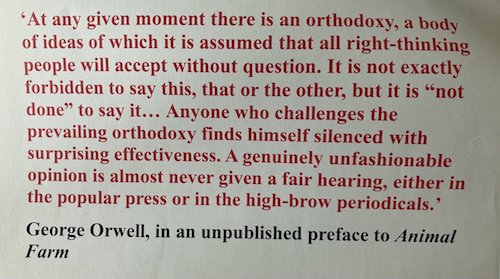

Trailer
Please watch this trailer for an upcoming film on vaccine harms, featuring @DrAseemMalhotra
Huge respect to @OracleFilmsUK & @uncut_truths for making this film pic.twitter.com/ROfDJERns6
— James Freeman (@JamesfWells) September 26, 2022
Malhotra
Extract 01
Dr Aseem Malhotra joins Dan Wootton to discuss a new Covid study pic.twitter.com/wo8J0nMBcu
— ZN2 (@ZN2_______) September 26, 2022

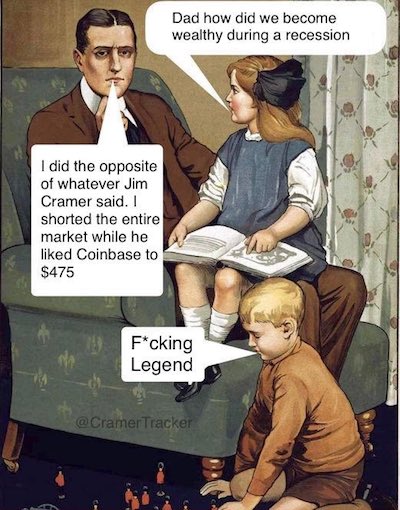

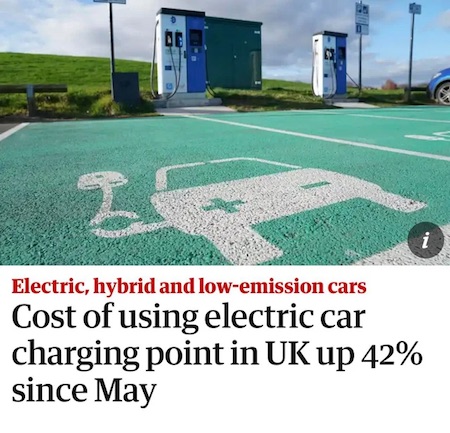

Einstein
The main difference between smart & intelligence.pic.twitter.com/0Pt5hZlc6T
— Tech Burrito (@TechAmazing) September 25, 2022


Support the Automatic Earth in virustime with Paypal, Bitcoin and Patreon.









Home › Forums › Debt Rattle September 27 2022